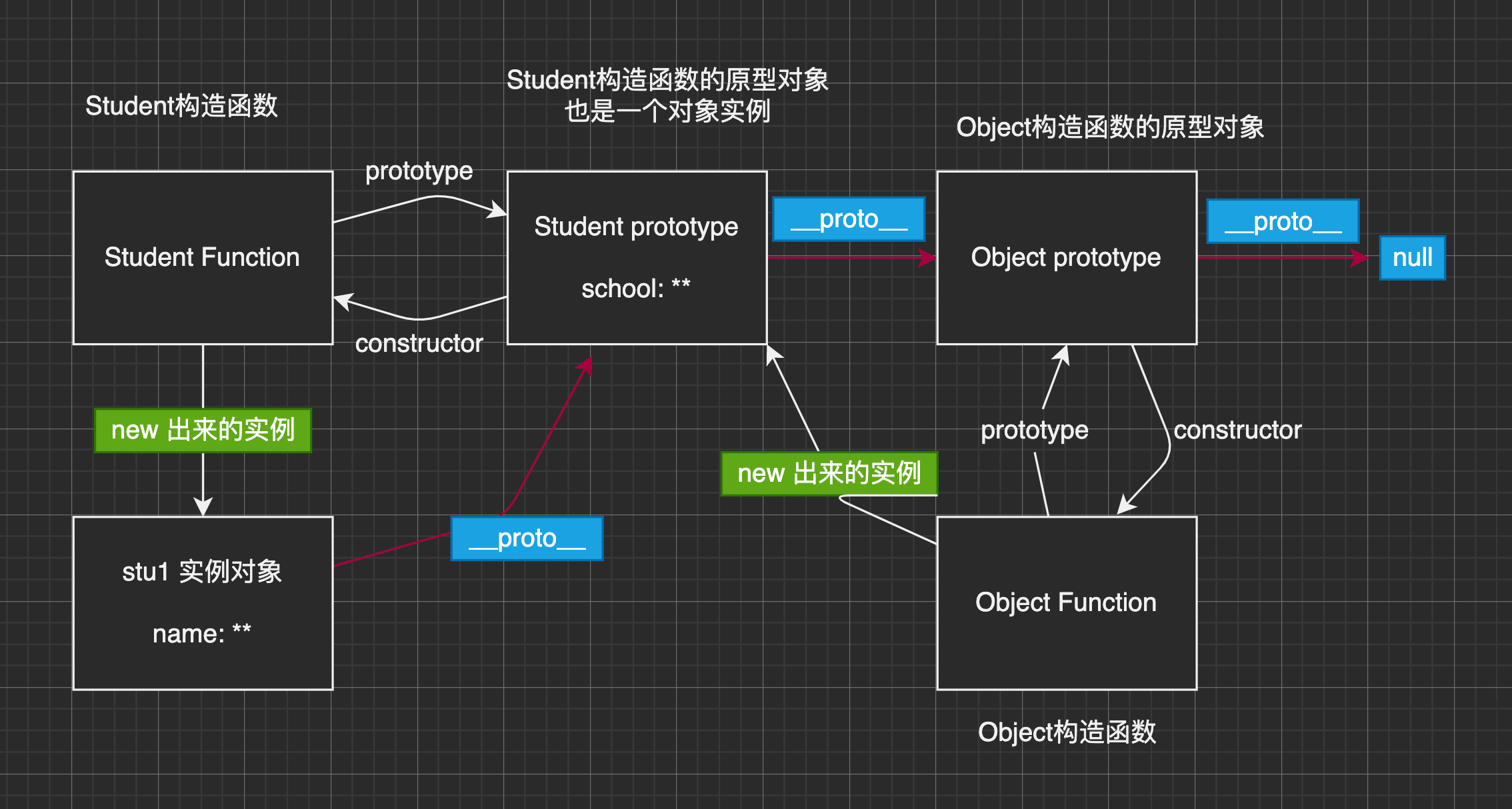技术专项 - 原型与原型链
原型与原型链
原型对象:绝⼤部分的函数(少数内建函数除外)都有⼀个 prototype 属性,这个属性是原型对象⽤来创建新对象实例,⽽所有被创建的对象都会共享原型对象,因此这些对象便可以访问原型对象的属性。
原型链:原因是每个对象都有 __proto__ 属性,此属性指向该对象的构造函数的原型。 对象可以通过 __proto__ 与上游的构造函数的原型对象连接起来,⽽上游的原型对象也有⼀个 __proto__,这样就形成了原型链。
html
<!-- 几个与 原型/原型链 密切相关的关键词 -->
prototype: 构造函数独有的
__proto__: 实例对象独有的
constructor: 原型对象里面的属性先看一段代码:
js
function Student(name) {
this.name = name;
}
Student.prototype.school = 'Shenzhen University';
let stu1 = new Student('Bob');
console.log(stu1.name) // print: ??
console.log(stu1.school) // print: ??
console.log(stu1.abc) // print: ??
console.log(stu1.__proto__) // print: ??
console.log(stu1.__proto__.__proto__) // print: ??
console.log(stu1.__proto__.__proto__.__proto__) // print: ??这是一段非常简单的构造函数进行实例化的代码。
首先,我们需要弄清楚 new 这个关键词运行时发生了什么?为什么实例 stu1 可以访问 school 属性?上述代码的打印结果是什么?
这里面就涉及到原型与原型链的相关知识。
先看一张我画的原型链草图。 
html
<!-- 原型链草图 分析 -->
1. 实例对象(以stu1为例)均有`__proto__`属性指向其构造函数(Student)的原型对象(Student prototype);
2. 构造函数(Student)的属性`prototype`属性指向其原型对象(Student prototype);
3. 原型对象(Student prototype)的属性`constructor`指向创建对象构造函数本身(Student);
4. 原型对象其实就是一个对象实例,也就是说「Student prototype」实际上就是 Object 构造函数new出来的实例,所以「Student prototype」有`__proto__`属性指向 「Object prototype」;
5. 「Object prototype」有`__proto__`属性指向 `null`;
6. 在 stu1实例对象 上查找属性或方法,会先在其自身查找,然后沿着上图红线方向依次查找,直至null。属性找不到会返回`undefined`,方法找不到会提示报错;
7. 上图红线就是一条「原型链」。现在我们来回顾一下上面代码的打印结果:
js
function Student(name) {
this.name = name;
}
Student.prototype.school = 'Shenzhen University';
let stu1 = new Student('Bob');
console.log(stu1.name) // print: Bob
console.log(stu1.school) // print: Shenzhen University
console.log(stu1.abc) // print: undefined
console.log(stu1.__proto__) // print: Student prototype
console.log(stu1.__proto__.__proto__) // print: Object prototype
console.log(stu1.__proto__.__proto__.__proto__) // print: null再来衍生一下相关知识:
js
function Student(name) {
this.name = name;
}
Student.prototype.school = 'Shenzhen University';
let stu1 = new Student('Bob');
console.log(stu1.__proto__ === Student.prototype) // print: true
console.log(stu1.__proto__.constructor === Student) // print: true注意
上述代码和草图分析均忽略了 「Function」构造函数这条线,但这并不影响你对原型和原型链的理解和分析。
思考一下以下代码为何都打印true?
js
function Student(name) {
this.name = name;
}
Student.prototype.school = 'Shenzhen University';
console.log(Student.constructor === Function) // print: true
console.log(Student.__proto__ === Function.prototype) // print: trueTIP
Student / Object 等构造函数,均是函数实例对象,都是由 Function 构造函数 new 出来的实例。